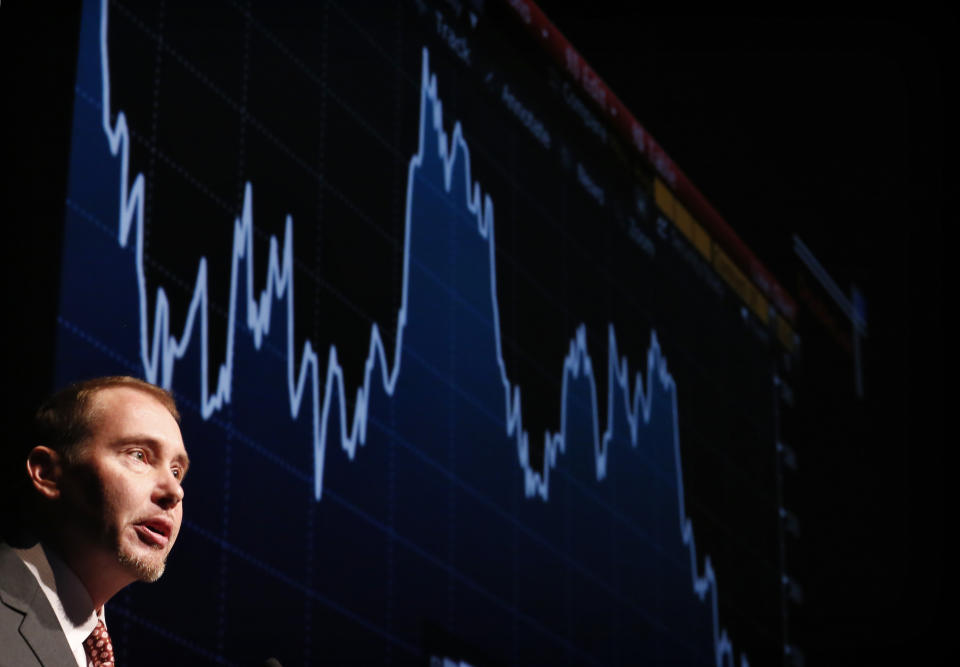Gundlach: A recession will come, so investors should start 'playing defense right now'
Billionaire bond investor Jeffrey Gundlach believes that even though recession risks have fallen, now is the time for investors to be "playing defense."
The U.S. economy has weathered the uncertainty of a full-fledged trade war between the world’s two largest economies far better than most economists expected. Yet even with a proactive Federal Reserve and a strong labor market, the CEO of $150 billion DoubleLine Capital believes a downturn is more a question of “when” than “if.”
The U.S. is “battling tooth and nail the next recession," Gundlach told Yahoo Finance in an exclusive wide-ranging sit-down. "The Fed has done, and the central banks, everything they can to avert the next recession. But a recession will come."
After Gundlach successfully played defense in 2007 and 2008, he went on offense in 2009 and put capital to work in the beaten-down mortgage bond sector and reaped the benefits.
"[When] the opportunity comes, you'll want dry powder to pounce on it,” he said. Gundlach emphasized investors need to be playing defense now, just like investors should have done so in 2006.
"I think playing defense is early. You probably should've started playing defense in 2018. And the fact that 2019 has been really good is just a better reason to play defense."
The hidden dangers in corporate bonds

Gundlach is one of the few investors who sounded the alarm in subprime, leading up to 2008’s credit crisis. In June 2007, he said subprime "is a total, unmitigated disaster, and it's only going to get worse." He successfully navigated the credit crisis for his clients.
Now, the 60-year-old investor believes that the next crisis will be more severe than the subprime meltdown — and it will be in corporate credit, where companies are holding record levels of debt on their books.
"You never have the same crisis twice," he said.
Gundlach pointed out that the corporate bond market is "probably significantly overrated, which sounds a lot like subprime in 2006." He added the leverage ratios suggest that one-third of corporate bonds should be rated junk right now, but they've received a pass to address this excessive debt.
In fact, on Wednesday S&P Global Ratings released new data showing the number of “weakest links” — or issuers with relatively weak credit ratings and/or negative outlooks — rose to 266 in October, up from 263 in September.
When the next downturn hits, Gundlach warned that “there won't be any idea of addressing these leverage ratios. They're just going to get a lot worse when the recession comes. And you're going to see en masse downgradings of the investment-grade corporate bond market.”
He predicted those strains will pressure bond prices and “lead to very significant divestment of a lot of the naive money that's gone into the corporate bond market. Because it's been a pretty smooth ride for the last 10 years. And it's been pretty rewarding this year as well."
He added that a lot of investors don't understand the risk that exists in corporate bonds, particularly when the next downturn hits.
For that reason, Gundlach recommended that “corporate bond exposure should be at absolute minimum levels right now. And I also think that non-U.S. exposure should be ramped up to maximum levels. For people that allocate globally, I think they should be moving towards the minimum of their range, whatever that number is."
Julia La Roche is a Correspondent at Yahoo Finance. Follow her on Twitter.
Read the latest financial and business news from Yahoo Finance
Follow Yahoo Finance on Twitter, Facebook, Instagram, Flipboard, SmartNews, LinkedIn, YouTube, and reddit.
